
Crystalweed / Unsplash
Male Cannabis Plants: Identifying Cannabis Gender
Male cannabis plants aren't given the credit they deserve. Here's how to spot a male plant and what to do with its flowers.
Cannabis is a complex plant with many unique characteristics, one of which is its dioecious nature.
Whether you’re a seasoned cultivator or just curious about the differences between male and female cannabis plants, understanding these differences is crucial.
In this article, we’ll dive deep into everything you need to know about male cannabis plants—from how to identify them early to their role in breeding, genetics, and industrial applications.
We’ll also address common myths and provide guidance on handling them properly, so you can make informed decisions about what to do with male cannabis plants in your grow.
Understanding Male vs. Female Cannabis Plants
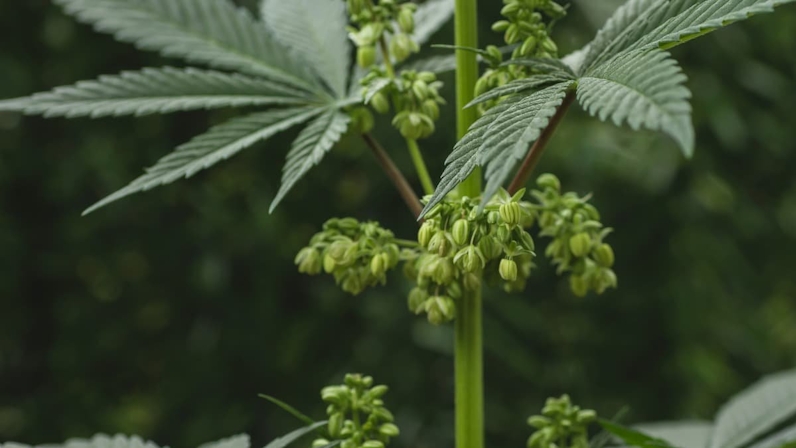
Cannabis plants are naturally dioecious, meaning they can be either male or female.
In some cases, a plant might even display hermaphroditic traits, possessing both male and female reproductive organs. However, for most growers, the primary focus is on distinguishing between male and female plants due to their vastly different roles.
Female cannabis plants are the stars of the show. They’re the ones that grow those sticky, resinous buds packed with THC and CBD—the stuff people actually want for smoking, vaping, or making edibles.
Male plants, on the other hand, don’t grow buds at all. Instead, they produce pollen sacs, which release pollen into the air. If that pollen reaches a female plant, she shifts gears and starts producing seeds instead of focusing on bud development.
Unless you’re breeding new strains, you probably don’t want male plants anywhere near your grow. A single male can pollinate an entire crop, turning your beautiful buds into a seed-filled disappointment. So, if you’re growing for flower, keep an eye out and remove any males before they get the chance to crash the party.
Key Differences Between Male and Female Plants
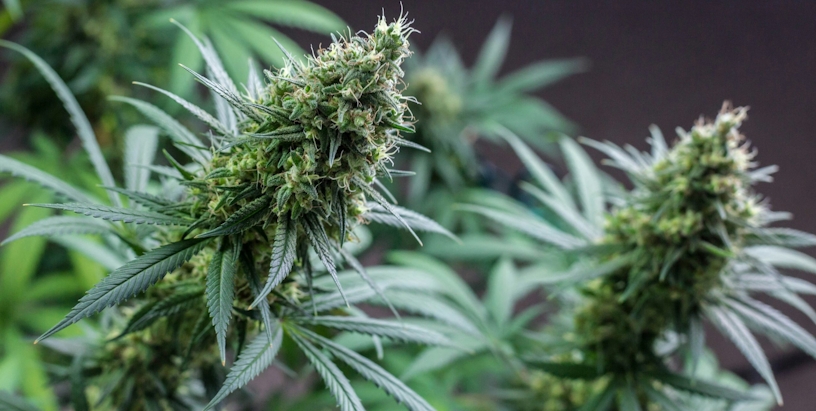
Jeff W / Unsplash
For those wondering how to tell a female cannabis plant from a male, knowing the physical differences is key.
While many pictures of male cannabis plants are available online to help beginners, hands-on experience and careful observation are just as important.
There are several distinct differences between male and female cannabis plants that every grower should be aware of:
Reproductive Structures
Male cannabis plants produce pollen sacs, which eventually open to release pollen. In contrast, female cannabis plants develop resinous flowers (buds) that are packed with cannabinoids.
Cannabinoid Content
Female plants are prized for their high levels of THC, CBD, and other cannabinoids, making them the preferred choice for both medicinal and recreational uses. Male cannabis plants, however, generally have lower cannabinoid content, which leads many to ask, “Do male cannabis plants have THC?”
While they do contain trace amounts of THC and CBD, their main value lies in fertilizing female plants. Smoking a male cannabis plant likely won’t get you high.
Growth Habits
In terms of growth patterns, male plants tend to be taller, with a more elongated structure and fewer leaves. They usually develop pollen sacs early on. On the other hand, female plants are bushier and develop clusters of leaves that eventually give rise to their signature flowering tops.
Function and Value
Comparing the female and male cannabis plants shows that while females are essential for cannabinoid-rich production, males are indispensable for genetic diversity and breeding programs. Observing these differences in leaf structure, height, and pre-flowering stages is a reliable guide for growers.
How to Identify Male Cannabis Plants Early
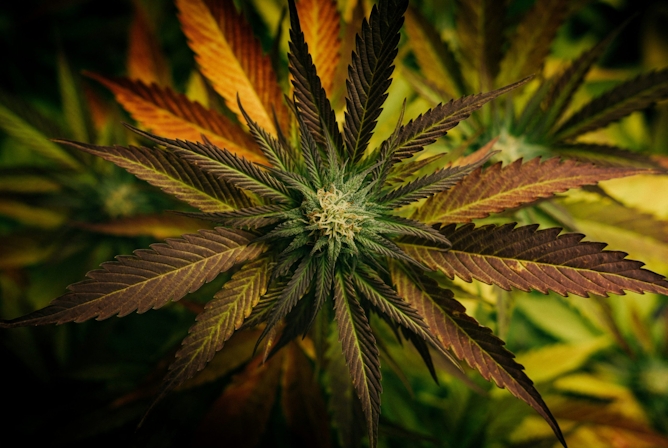
Tim Foster A / Unsplash
Early identification of male cannabis plants is critical, especially if you are growing for sinsemilla (seedless buds). Removing male plants at the right time ensures that your female plants remain unpollinated and continue to produce high-quality, resinous buds.
Here’s a detailed look at how to identify male cannabis plants early in their growth cycle:
Growth Patterns
Height and Structure
Male cannabis plants often grow taller than their female counterparts. They exhibit more vertical growth, and the internodal spacing (the space between nodes) is generally greater. This rapid, lanky growth pattern can be a hint that you’re looking at an early male weed plant.
Leaf Development
Males typically develop fewer leaves than females. While females produce a bushy, dense canopy to support bud development, male plants focus on height and structure, meaning they may have sparser foliage. Questions like “How many leaves does a male weed plant have?” are common, and the answer is that males generally have fewer and fewer intricate leaves compared to full-grown female plants.
Pre-Flowers
Pollen Sac Formation
Around 3 to 6 weeks into the vegetative stage, male cannabis plants begin forming pre-flowers at their nodes. These pre-flowers appear as small, round structures that eventually mature into pollen sacs. They lack the white pistils that are characteristic of female pre-flowers. If you’ve ever searched for images of male cannabis plants, you’ll notice these small, ball-like structures as a defining feature.
Absence of Buds
Unlike females, male plants do not develop sticky, resinous flowers. Their pre-flowers are solely meant for reproduction. This is one of the easiest ways to differentiate between a male and a female cannabis plant.
Additional Visual Differences
Early Signs of a Male Weed Plant
Beyond the growth pattern and pre-flower differences, early signs of a male weed plant include a more sparse branching pattern and the absence of the dense, bud-producing clusters seen in female plants. Knowing how to tell a male weed plant from a female is essential for growers who wish to optimize their crop yield and maintain high cannabinoid levels in their harvest.
Full-Grown Male Weed Plant
When a male plant matures, it exhibits a robust, tall structure with distinct pollen sacs that eventually release pollen. These plants may even appear slightly lanky compared to the more compact, resinous female counterparts. Observing the full-grown male weed plant provides additional confirmation of its sex and potential role in your cultivation process.
The Role of Male Cannabis Plants

Crystalweed / Unsplash
Despite often being overlooked, male cannabis plants are far from useless. They play several vital roles in both commercial cultivation and breeding programs, contributing to the overall health and genetic strength of cannabis crops.
Pollination for Breeding
As mentioned, one of the most critical roles of the male cannabis plant is its contribution to pollination.
Male plants produce pollen that is essential for the reproduction of female cannabis plants.
In controlled breeding programs, growers carefully select male plants with desirable traits—such as pest resistance or superior growth rates—to pollinate female plants. This deliberate pollination is the foundation for developing new hybrids and strains that cater to specific preferences, whether for flavor, yield, or cannabinoid profile.
Seed Production
For breeders and seed producers, pollination is not just a byproduct; it is a carefully managed process that results in high-quality seeds.
Without male plants, developing and preserving genetic diversity would be nearly impossible. This is why many growers wonder, “What to do with male cannabis plants?”
In breeding programs, their role is invaluable, and they are kept under controlled conditions to ensure optimal cross-pollination.
Genetic Strength & Stability

Elle Cartier / Unsplash
Male cannabis plants contribute significantly to the overall genetic strength and stability of a crop. They pass on critical traits to their offspring, including:
Pest and Disease Resistance: Certain male plants carry genetic traits that make them resistant to pests, mold, and other common issues. By using these males in breeding programs, growers can develop more resilient hybrid strains that thrive even under challenging environmental conditions.
Environmental Tolerance: Males often pass down genes that confer tolerance to various environmental stressors, such as extreme temperatures or high humidity. This genetic contribution is vital for creating stable and high-yielding crops.
Growth and Structural Integrity: The structural strength seen in male cannabis plants, including their tall and sturdy stalks, is a trait that can be passed on to offspring. This ensures that new strains not only produce quality buds but also have robust growth characteristics that can withstand cultivation challenges.
Industrial & Hemp Applications
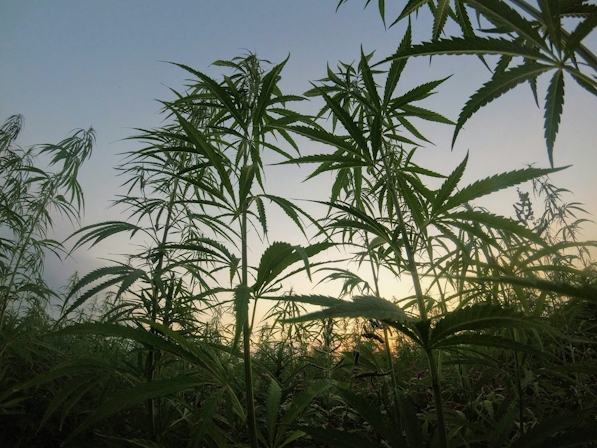
Matteo Paganelli / Unsplash
Beyond traditional cannabis cultivation for medicinal and recreational use, male cannabis plants have an important role in the industrial hemp sector. Their sturdy stalks are highly valued for fiber production. Here’s why:
Fiber Production: Male plants are often preferred for industrial applications because their strong, fibrous stalks can be used to produce textiles, clothing, ropes, sails, and even biodegradable plastics. The durability and flexibility of these fibers have made hemp a popular choice for sustainable materials.
Trace Cannabinoids and Therapeutic Benefits: Although male plants generally contain lower levels of cannabinoids, some research suggests that even small amounts of compounds like CBD can have therapeutic benefits. While female plants are the primary source of cannabinoid-rich flowers, the role of male plants in providing additional genetic diversity and potential health benefits should not be underestimated.
Historical Uses of Male Cannabis Plants

Elsa Olofsson / Unsplash
Throughout history, male cannabis plants have been utilized for a variety of purposes beyond modern breeding and fiber production. Their uses have spanned ancient civilizations, traditional medicine, and even military applications.
Ancient Civilizations
China: In ancient China, cannabis fibers—often sourced from male plants—were instrumental in the early development of paper and fabric production. The strength and durability of these fibers were key to their use in everyday items, setting the stage for advancements in technology and culture.
Egypt: Remnants of hemp textiles have been discovered in Egyptian tombs, suggesting that ancient Egyptians utilized male cannabis plants for making durable clothing and other essential goods. The versatility of the plant allowed it to be incorporated into various aspects of daily life.
Traditional Medicine
Herbal Remedies: Across various ancient cultures, both the roots and leaves of male cannabis plants were used in herbal remedies. Traditional practitioners brewed teas and tinctures from these parts to treat inflammation, pain, and other ailments. Though not as potent as the resinous flowers from female plants, male cannabis offered a range of therapeutic benefits.
Ayurvedic Practices: In Ayurveda, the ancient Indian system of medicine, cannabis was occasionally used as part of holistic treatments. Male plants, with their unique chemical profiles, played a minor yet noteworthy role in formulations aimed at balancing bodily functions and alleviating certain conditions.
Military and Maritime Uses
Naval Applications: Male cannabis plants were historically cultivated for their robust fibers, which were essential in the production of strong ropes and sails. European navies, in particular, relied on hemp to outfit their ships, ensuring that vessels were equipped with durable materials capable of withstanding harsh sea conditions.
World War II Efforts: During World War II, governments, including the United States, recognized the strategic importance of hemp. Farmers were encouraged to grow hemp—male plants included—to supply materials needed for rope, uniforms, and other military essentials. This large-scale cultivation underscored the industrial significance of male cannabis plants in times of national need.
Should You Keep or Remove Male Cannabis Plants?

Esteban Lopez / Unsplash
One of the most important decisions a cannabis cultivator must make is whether to keep or remove male cannabis plants.
This decision largely depends on your goals—whether you’re growing for high-quality, cannabinoid-rich buds or for breeding and industrial applications.
If you’re growing for potent, seedless buds, remove male plants early to prevent pollination. But, if you’re breeding new strains or collecting pollen for future use, keeping select males is beneficial. And don’t forget about fiber production in hemp cultivation, where males also have value!
Unless breeding or fiber is your goal, removing males makes sure you will have a harvest of buds from female plants.
How to Handle Male Cannabis Plants Properly
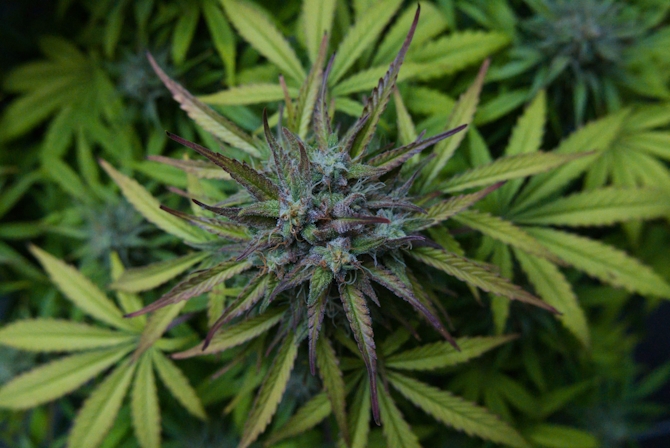
Philipp / Unsplash
If you’ve decided to keep male cannabis plants for breeding or industrial purposes, proper handling is essential to prevent accidental pollination and maintain the integrity of your crop. Here are some best practices to ensure that male plants contribute positively to your cultivation efforts:
Preventing Accidental Pollination
Early Separation: Once you identify a male cannabis plant—by its growth patterns or the formation of pre-flowers—it’s important to immediately separate it from your female plants. This isolation minimizes the risk of unwanted cross-pollination.
Controlled Airflow: In indoor grow environments, controlling airflow is crucial. Use fans and filters to manage the movement of air and prevent pollen from circulating between male and female plants.
Dedicated Tools: When handling male cannabis plants, consider using separate tools and even dedicated clothing to avoid inadvertently transferring pollen to your female plants.
Collecting & Storing Pollen
For growers involved in breeding, collecting and storing pollen from male cannabis plants is a valuable practice:
Collection Process: When male plants reach the appropriate stage of flowering, gently shake the pollen sacs over a clean container or parchment paper to collect the pollen. This method helps gather the pollen without damaging the plant.
Storage Techniques: Once collected, store the pollen in an airtight container kept in a cool, dry place. Some cultivators choose to freeze the pollen for long-term storage, ensuring that it remains viable for future breeding projects.
Proper Disposal Methods
If your objective is to remove male cannabis plants, it’s essential to dispose of them safely to prevent accidental pollination:
Secure Removal: Carefully bag up the male plants before removing them from your grow space to minimize the risk of stray pollen dispersal.
Safe Disposal: Consider burning or composting the plant material in a controlled manner. This process helps ensure that no residual pollen is left behind that could compromise your crop.
Thorough Clean-Up: After removing the plants, dispose of any contaminated soil or containers that might still harbor pollen. A clean environment is critical for successful cultivation.
Herb Recommended Products:
READ MORE










